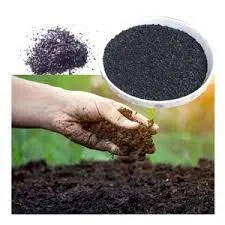Introduction
In the realm of agriculture, the quest for sustainable solutions that enhance soil fertility and plant health is unceasing. Humic acid, a natural organic substance derived from decomposed plant matter, has emerged as a key player in soil enrichment and plant growth. This article delves into the significance of humic acid, introduces the leading supplier in Thoothukudi, and explores its transformative potential in modern farming practices.
The Essence of Humic Acid: Nourishing the Soil and Beyond
An Ancient Remedy
For centuries, farmers have harnessed the benefits of humic acid-rich materials like peat and compost to boost soil productivity.
Soil Vitality and Structure
Humic acid improves soil structure, enhancing water retention, aeration, and nutrient-holding capacity.
Nutrient Delivery
Humic acid acts as a chelating agent, facilitating the uptake of essential nutrients by plants.
Leading the Way: The Best Humic Acid Supplier in Thoothukudi
AgroRevitalize: A Commitment to Excellence
AgroRevitalize, the leading humic acid supplier, is dedicated to providing farmers with high-quality, organic humic acid products.
Customized Solutions for Thoothukudi’s Soil
The supplier offers humic acid formulations tailored to Thoothukudi’s soil characteristics, addressing specific nutrient deficiencies.
Expert Guidance for Optimal Results
AgroRevitalize collaborates with local farmers, offering expert advice on humic acid application to maximize agricultural yields.
The Humic Acid Advantage: Enhancing Crop Performance
Enhanced Nutrient Uptake
Humic acid enhances nutrient absorption by plants, leading to improved growth, yield, and quality.
Soil Enrichment
By promoting microbial activity and nutrient availability, humic acid fosters a fertile and resilient soil ecosystem.
Stress Resilience
Plants treated with humic acid exhibit enhanced resistance to environmental stressors such as drought and disease.
Embracing Sustainable Agriculture: Humic Acid’s Far-Reaching Impact
Reduced Chemical Dependency
The utilization of humic acid reduces the need for synthetic fertilizers, contributing to a more sustainable agricultural system.
Improved Carbon Sequestration
Humic acid aids in carbon sequestration, playing a role in mitigating climate change by capturing atmospheric carbon dioxide.
Enhanced Water Management
Humic acid-enriched soils have improved water-holding capacity, reducing water runoff and minimizing soil erosion.
Conclusion: Cultivating Prosperity Through Humic Acid
The adoption of humic acid in Thoothukudi’s agricultural practices signifies a shift toward regenerative and sustainable farming. AgroRevitalize’s commitment to delivering top-tier humic acid products supports the vision of a thriving agricultural community.
Frequently Asked Questions
- Is humic acid suitable for all soil types? Yes, humic acid benefits various soil types, enhancing their structure and nutrient-holding capacity.
- How often should humic acid be applied? Application frequency varies, but generally, humic acid can be applied 2 to 4 times during a growing season.
- Does humic acid replace other fertilizers? Humic acid complements fertilizers by improving nutrient uptake and soil conditions, potentially reducing the need for excessive fertilization.
- Is humic acid safe for the environment? Yes, humic acid is organic and environmentally friendly, posing no harm to ecosystems.
- Can humic acid be used in organic farming? Absolutely, humic acid is a staple in organic farming, aligning with its natural and sustainable principles.




